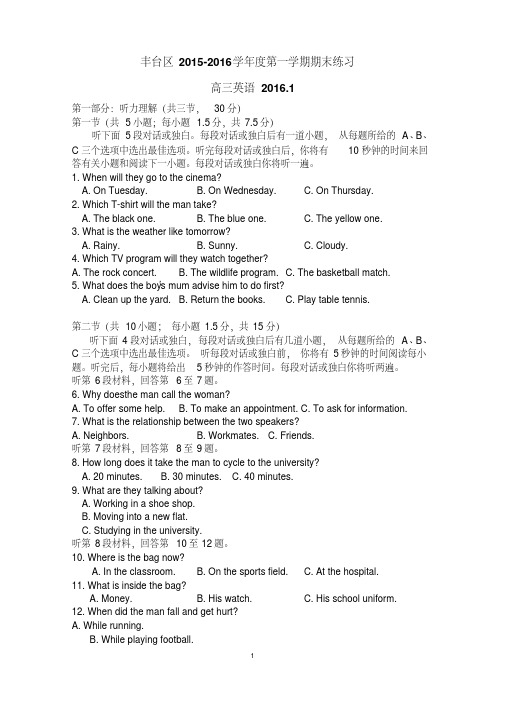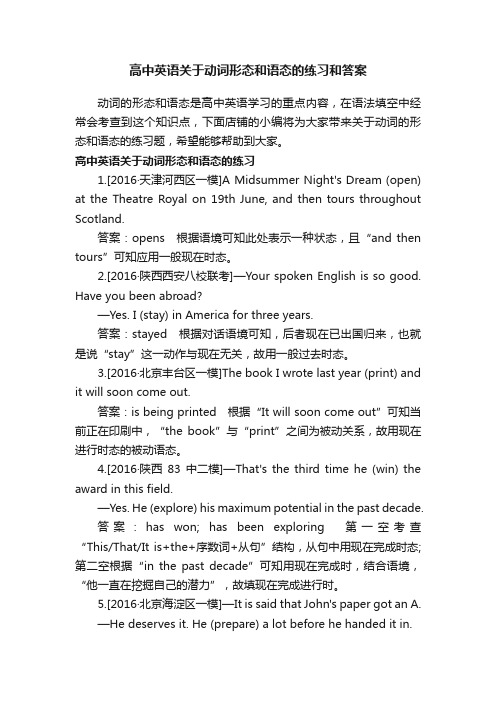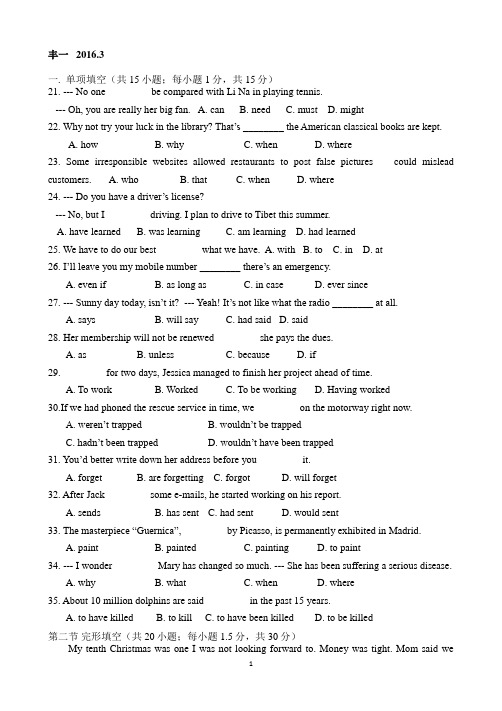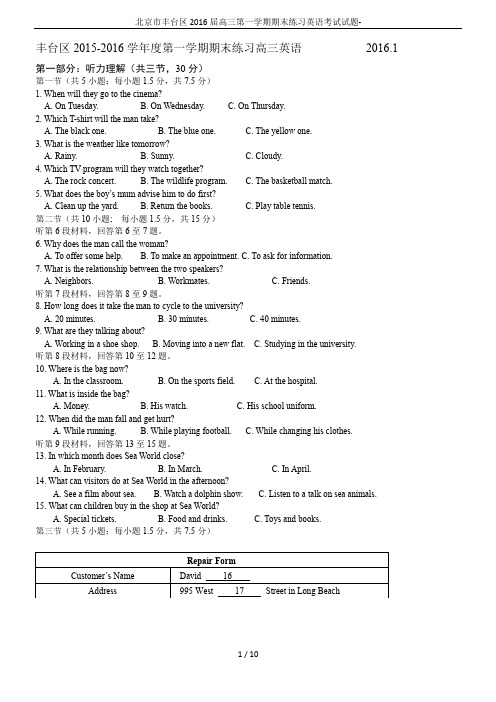2016丰台区届高三英语一模试题及答案
2016.1丰台区期末高三英语试题及答案

丰台区2015-2016学年度第一学期期末练习高三英语2016.1第一部分:听力理解(共三节,30分)第一节(共5小题;每小题 1.5分,共7.5分)听下面5段对话或独白。
每段对话或独白后有一道小题,从每题所给的A、B、C三个选项中选出最佳选项。
听完每段对话或独白后,你将有10秒钟的时间来回答有关小题和阅读下一小题。
每段对话或独白你将听一遍。
1. When will they go to the cinema?A. On Tuesday.B. On Wednesday.C. On Thursday.2. Which T-shirt will the man take?A. The black one.B. The blue one.C. The yellow one.3. What is the weather like tomorrow?A. Rainy.B. Sunny.C. Cloudy.4. Which TV program will they watch together?A. The rock concert.B. The wildlife program.C. The basketball match.5. What does the boy’s mum advise him to do first?A. Clean up the yard.B. Return the books.C. Play table tennis.第二节(共10小题; 每小题1.5分,共15分)听下面4段对话或独白,每段对话或独白后有几道小题,从每题所给的A、B、C三个选项中选出最佳选项。
听每段对话或独白前,你将有5秒钟的时间阅读每小题。
听完后,每小题将给出5秒钟的作答时间。
每段对话或独白你将听两遍。
听第6段材料,回答第6至7题。
6. Why doesthe man call the woman?A. To offer some help.B. To make an appointment.C. To ask for information.7. What is the relationship between the two speakers?A. Neighbors.B. Workmates.C. Friends.听第7段材料,回答第8至9题。
2016丰台区高三英语一模试题及答案

2015年北京市丰台区高三英语一模试题第二部分:知识运用(共两节,45分)第一节单项填空(共15小题;每小题1分,共15分)从每题所给的A、B、C、D四个选项中,选出可以填入空白处的最佳选项,并在答题卡上将该项涂黑。
( )21. --- No one ________ be compared with Li Na in playing tennis.--- Oh, you are really her big fan.A. canB. needC. mustD. might( )22. Why not try your luck in the library? That’s ________ the American classical books are kept.A. howB. whyC. whenD. where( )23. Some irresponsible websites allowed restaurants to post false pictures ______ could mislead customers.A. whoB. thatC. whenD. where( )24. --- Do you have a driver’s license?--- No, but I ________ driving. I plan to drive to Tibet this summer.A. have learnedB. was learningC. am learningD. had learned ( )25. We have to do our best ________ what we have.A. withB. toC. inD. at( )26. I’ll leave you my mobile number ________ there’s an emergency.A. even ifB. as long asC. in caseD. ever since( )27. --- Sunny day today, isn’t it?--- Yeah! It’s not like what the radio ________ at all.A. saysB. will sayC. had saidD. said( )28. Her membership will not be renewed ________ she pays the dues.A. asB. unlessC. becauseD. if( )29. ________ for two days, Jessica managed to finish her project ahead of time.A. To workB. WorkedC. To be workingD. Having worked ( )30. If we had phoned the rescue service in time, we ________ on the motorway right now.A. weren’t trappedB. wouldn’t be trappedC. hadn’t been trappedD. wouldn’t have been trapped( )31. You’d better write down her address before you ________ it.A. forgetB. are forgettingC. forgotD. will forget( )32. After Jack ________ some e-mails, he started working on his report.A. sendsB. has sentC. had sentD. would sent ( )33. The masterpiece “Guernica”, ________ by Picasso, is permanently exhibited in Madrid.A. paintB. paintedC. paintingD. to paint( )34. --- I wonder ________ Mary has changed so much.--- She has been suffering a serious disease.A. whyB. whatC. whenD. where( )35. About 10 million dolphins are said ________ in the past 15 years.A. to have killedB. to killC. to have been killedD. to be killed第二节完形填空(共20小题;每小题1.5分,共30分)阅读下面短文,掌握其大意,从每题所给的A、B、C、D四个选项中,选出最佳选项,并在答题卡上将该项涂黑。
2015-2016年北京丰台高三上学期期末英语试题及答案

2015-2016年北京丰台高三上学期英语试题及答案丰台区2015—2016学年度第一学期期末练习高三英语2016.01第一部分:听力理解(共三节,30分)第一节(共5小题;每小题1.5分,共7.5分)听下面5段对话或独白。
每段对话或独白后有一道小题,从每题所给的A、B、C三个选项中选出最佳选项。
听完每段对话或独白后,你将有10秒钟的时间来回答有关小题和阅读下一小题。
每段对话或独白你将听一遍。
1. When will they go to the cinema?A. On Tuesday.B. On Wednesday.C. On Thursday.2. Which T-shirt will the man take?A. The black one.B. The blue one.C. The yellow one.3. What is the weather like tomorrow?A. Rainy.B. Sunny.C. Cloudy.4. Which TV program will they watch together?A. The rock concert.B. The wildlife program.C. The basketball match.5. What does the boy’s mum advise him to do first?A. Clean up the yard.B. Return the books.C. Play table tennis.第二节(共10小题; 每小题1.5分,共15分)听下面4段对话或独白,每段对话或独白后有几道小题,从每题所给的A、B、C三个选项中选出最佳选项。
听每段对话或独白前,你将有5秒钟的时间阅读每小题。
听完后,每小题将给出5秒钟的作答时间。
每段对话或独白你将听两遍。
听第6段材料,回答第6至7题。
6. Why does the man call the woman?A. To offer some help.B. To make an appointment.C. To ask for information.7. What is the relationship between the two speakers?A. Neighbors.B. Workmates.C. Friends.听第7段材料,回答第8至9题。
【高考模拟试题及答案】2016北京丰台区高三一模英语试题及答案

【高考模拟试题及答案】2016北京丰台区高三一模英语试题及答案
北京市丰台区高三一模将于3月31日-4月1日考试,高考网小编会在一模考试结束后第一时间整理《2016北京丰台山区高三一模英语试题及答案》,供考生参考。
同学们可收藏本页面,便于考试后查看。
2016高三一模试题及答案请点击>>全国各省市2016高三一模试题及答案
点击查看2016北京市各区高三一模试题及答案汇总
点击查看2016北京丰台区高三一模各科试题及答案
高考语文考点高考数学考点高考英语考点高考理综考点高考文综考点高考语文复习资料高考数学复习资料高考英语复习资料高考理综复习资料高考文综复习资料高考语文模拟试题高考数学模拟试题高考英语模拟试题高考理综模拟试题高考文综模拟试题高考语文历年真题高考数学历年真题高考英语历年真题高考理综历年真题高考文综历年真题高考备考辅导;高考食谱大全;高考前必须做的事。
高中英语关于动词形态和语态的练习和答案

高中英语关于动词形态和语态的练习和答案动词的形态和语态是高中英语学习的重点内容,在语法填空中经常会考查到这个知识点,下面店铺的小编将为大家带来关于动词的形态和语态的练习题,希望能够帮助到大家。
高中英语关于动词形态和语态的练习1.[2016·天津河西区一模]A Midsummer Night's Dream (open) at the Theatre Royal on 19th June, and then tours throughout Scotland.答案:opens 根据语境可知此处表示一种状态,且“and then tours”可知应用一般现在时态。
2.[2016·陕西西安八校联考]—Your spoken English is so good. Have you been abroad?—Yes. I (stay) in America for three years.答案:stayed 根据对话语境可知,后者现在已出国归来,也就是说“stay”这一动作与现在无关,故用一般过去时态。
3.[2016·北京丰台区一模]The book I wrote last year (print) and it will soon come out.答案:is being printed 根据“It will soon come out”可知当前正在印刷中,“the book”与“print”之间为被动关系,故用现在进行时态的被动语态。
4.[2016·陕西83中二模]—That's the third time he (win) the award in this field.—Yes. He (explore) his maximum potential in the past decade.答案:has won; has been exploring第一空考查“This/That/It is+the+序数词+从句”结构,从句中用现在完成时态;第二空根据“in the past decade”可知用现在完成时,结合语境,“他一直在挖掘自己的潜力”,故填现在完成进行时。
2016届北京市丰台区普通中学高三上学期期中考试英语试题及答案

北京市丰台区普通中学2015-2016学年第一学期高三期中英语试题班姓名学号得分第Ⅰ卷第一部分:听力理解(共两节,30分)第一节(共5小题;每小题1.5分,满分7.5分)听下面5段对话。
每段对话后有一个小题,从题中所给的A、B、C三个选项中选出最佳选项。
并标在试卷的相应位置。
听完每段对话后,你都有10秒钟的时间来回答有关小题和阅读下一小题。
每段对话仅读一遍。
1. What kind of person is the man?A. He is friendly.B. He is honest.C. He is funny.2. What was said about the woman's sister?.A. She didn't go to schoolB. She had an accidentC. She was badly hurt.3. What is the man doing at the airport?A. Answering a passenger's question.B. Leaving for New York City.C. Waiting for his sister.4. What did the woman ask the man?A. Whether he could let her use his office.B. Whether he had to work on the weekend.C. Whether he could help her with her project5. What does the man mean?A. His brother is coming to celebrate his birthday.B. His brother will give him a birthday presentC. His brother never forgets his own birthday.第二节(共15小题;每小题1.5分,满分22.5分)听下面5段对话或独白。
2016年北京市丰台区英语一模试卷及答案

丰一 2016.3一.单项填空(共15小题;每小题1分,共15分)21. --- No one ________ be compared with Li Na in playing tennis.--- Oh, you are really her big fan. A. can B. need C. must D. might22. Why not try your luck in the library? That’s ________ the Americ an classical books are kept.A. howB. whyC. whenD. where23. Some irresponsible websites allowed restaurants to post false pictures __ could mislead customers. A. who B. that C. when D. where24. --- Do you hav e a driver’s license?--- No, but I ________ driving. I plan to drive to Tibet this summer.A. have learnedB. was learningC. am learningD. had learned25. We have to do our best ________ what we have. A. with B. to C. in D. at26. I’ll leave you my mobile number ________ there’s an emergency.A. even ifB. as long asC. in caseD. ever since27. --- Sunny day today, isn’t it? --- Yeah! It’s not like what the radio ________ at all.A. saysB. will sayC. had saidD. said28. Her membership will not be renewed ________ she pays the dues.A. asB. unlessC. becauseD. if29. ________ for two days, Jessica managed to finish her project ahead of time.A. To workB. WorkedC. To be workingD. Having worked30.If we had phoned the rescue service in time, we ________ on the motorway right now.A. weren’t trappedB. wouldn’t be trappedC. hadn’t been trappedD. wouldn’t have been trapped31. You’d better write down her add ress before you ________ it.A. forgetB. are forgettingC. forgotD. will forget32. After Jack ________ some e-mails, he started working on his report.A. sendsB. has sentC. had sentD. would sent33. The masterpiece “Guernica”, ________ by Picasso, is permanently exhibited in Madrid.A. paintB. paintedC. paintingD. to paint34. --- I wonder ________ Mary has changed so much. --- She has been suffering a serious disease.A. whyB. whatC. whenD. where35. About 10 million dolphins are said ________ in the past 15 years.A. to have killedB. to killC. to have been killedD. to be killed第二节完形填空(共20小题;每小题1.5分,共30分)My tenth Christmas was one I was not looking forward to. Money was tight. Mom said wewere old enough not to counton 36 . Just being together would be enough.We weren’t the only family in our small community who would hav e a 37 Christmas. But the knowledge that others were going through the same thing didn’t 38 much.One night we had a small pity party for each other.“How can I even wear that same old dress one more time?” I 39 .“I know,” said my sister. “I think I might as well give up asking for a 40 .”The next day, Mom told us that she had been saving up and shopping around so that we could give the Walters family a Christmas basket.“If anyone needs some 41 , it’s the Walters.” Mom remind ed us.The Walters! They were the strangest people we knew. How could Mom be so 42 with them when our own family didn’t have enough?Mom was determined. She packed flour and sugar, a small turkey, some fruits in a basket and asked us to 43 it to the Walters.I really didn’t like to have anything to do with them. Not wanting to be 44 , we left the basket on the doorstep and hid behind a nearby bush.Seeing the Walters gather up their basket, I asked in whisper, “Did they look happy?”“Well, yeah, happy, but mostly they looked like they were thinking, Maybe we do belong.”Christmas morning arrived. To my great 45 , I received a fabulous-looking dress.I couldn’t believeit’s for me. I was about to speak 46 we noticed Dad ride up atop a new horse. My sister screamed and ran out. She couldn’t 47 to meet her “gift”.“Mom, how did you do all this?” I asked. “We were 48 for a no-present Christmas.”“Oh, not necessarily 49 but justhelping each other. Mrs. Olsen at the dress shop let me bring your gift home. Dad offered to hang up Mrs. Marshall’s tree lights. Mr. Jones had a horse and he was 50 to know we had someone to love it.”“I thought since you were giving away food to the Walters, we would never have enough. They re ally don’t have anything to give in 51 .”“We are like a big family. Never 52 who can or who can’t give. The most important is that we should listen to our hearts. Perhaps the right gifts will end up with the right families.”Mom always knew 53 . Thinking about the expression on the Walters’s faces when they discovered the Christmas basket, I realized their “ 54 ” feeling was more precious than any of the gifts.That was the Christmas that I learned about the magic of 55 .36. A. games B. parties C. gifts D. trips37. A. simple B. regular C. grand D. peaceful38. A. judge B. help C. cover D. pay39. A. begged B. insisted C. laughed D. complained40. A. tree B. light C. dress D. horse41. A. trust B. cheer C. praise D. courage42. A. patient B. strict C. generous D. popular43. A. deliver B. award C. show D. lend44. A. excused B. caught C. realized D. recognized45. A. relief B. alarm C. fear D. surprise46. A. since B. when C. after D. before47. A. expect B. intend C. wait D. decide48. A. ready B. eager C. known D. responsible49. A. checking B. trading C. hesitating D. quarreling50. A. proud B. afraid C. happy D. worried51. A. return B. store C. vain D. effect52. A. tease B. forget C. mind D. ignore53. A. truth B. duty C. dreams D. choices54. A. inspiring B. relaxing C. satisfying D. belonging55. A. believing B. giving C. forgiving D. communicating第三部分:阅读理解(共两节,40分)第一节(共15小题;每小题2分,共30分)AThe Johnson Family RanchActivitiesHorseback RidingThe horseback riding program is most popular56. What is important to wear when riding?A. Warm clothes.B. Loose jeans.C. Hiking boots.D. Cowboy boots.57. You’d better bring your own equipment for ________.A. horseback ridingB. fly fishingC. cattle workD. mountain biking58. Where can you possibly read this article?A. In a novel .B. In a science magazine.C. In a travelling guide.D. In a history textbook.BThe Wake-up Call“What’s that?” my ten-year-old dau ghter, Genie, asked. She’dcaught me laughing at a piece of mail I’d just opened. “Wake-upservice; $2.50 per call.” At the bottom was a phone number and adrawing of a rotary phone, like the one my great-aunt Sara hadowned 40 years ago.“Is that mail funny?” Genie asked.“Not really,” I admitted. “It’s just outdated.”“What’s a wake-up call?” She frowned. I explained how, before smart-phones, people sometimes paid someone to wake them with a call.“Who sent this flyer?” she pressed.“Probably someone older,” I said, “and could use some money.”Her eyes lit up. “Can we order a wake-up?” she asked.“We don’t need it.” I picked it up and headed for the recycling bin.“Wait!” she shrieked.“I feel sorry for the wake-up man, if he needs some money,” she said, tearing up. “Can’t we order?”I looked at the flyer with its drawing of a rotary phone. I remembered, again, my great-aunt Sara and her rotary phone. As a kid, I’d visited her over Labor Day, when Jerry Lewis would host his charity event for the disabled kids. Aunt Sara would squeeze my hand, then reach for the rotary phone, dialing the number on the screen. Holding the receiver between us, we’d announce to the operator, “We’d like to help those kids.”Now here was my own child, showing the same big heart I’d once been encouraged to have, and how could I ignore her? I Googled the flyer’s return address. The address belonged to a man called Raymond. He was in his mid-60s. We called him and, holding the receiver between us, the way Aunt Sara and I used to, t old him we needed his services. “Great!” Raymond said in a shaky but friendly voice, clearly amazed at receiving an order from a child. When I asked how to pay the $2.50, he answered, “Mail a check.”Genie was happy all week. Friday night, I put the phone by her pillow so she could answer Raymond’s call. She bounded to my bedroom to tell me all about how he’d wished her a good morning and told her to have a great day, which she did.Technology has made some things outdated. But there are still other things the world will always require. In the rush and hustle of my daily life, I’d temporarily forgotten that. I guess I just needed a wake-up call.59. The author laughed at the mail because ________.A. it was printed roughlyB. the drawing in it was poorC. the wake-up call cost too muchD. the service it offered was outdated60. What did the author want to do with the flyer at first?A. Throw it away.B. Let Genie read it.C. Find out who sent it.D. Keep it away from Genie.61. What made the author finally decide to order a wake-up call?A. Her own childhood experience.B. The less fortunate wake-up man.C. Genie’s curiosity about the service.D. The information she found on Google.62. What might “other things” in the last paragraph refer to?A. Bravery and curiosity.B. Confidence and patience.C. Honesty and humor.D. Generosity and kindness.CThe truth was written all over her face. The eyes are the window to the soul. From those sayings, you would think that we could read faces. In fact, people tend to overestimate their ability to do it.Most of us can’t distinguish between certain expressions without contextual clues. In one study, participants were unable to tell whether faces in photos were showing pain or pleasure about a quarter of the time. In another, when people watched silent videos of the same person experiencing pain and faking pain, they couldn’t tell which was which.And yet, as bad as we are at reading expressions, we jump to all kinds of conclusions based on people’s faces. We might scoff at the ancient physiognomy—assessing character on the basis of facial feature—but we unknowingly practice it daily. Recent research shows that while there’s practically no evidence that faces reveal character, we nonetheless behave as if certain features signal certain traits. People with typically “female” facial features seem more trustworthy; those with lower eyebrows appear more controlling. In another study, people were ready to decide whether an unfamiliar face should be trusted after looking at it for just 200 milliseconds. Even when given a chance to look longer, they rarely changed their mind.Such judgments can defy logic. Subjects playing a trust game invested more money with a player who had a trustworthy face than with one who didn’t—even when the two players had the same fame. Another study reported that judges needed less evidence to sentence a person with an untrustworthy face. And a researcher focusing on the Israeli-Palestinian conflict found that a Palestinian peace offering was more likely to be accepted by Jewish Israeli if it was attributed to a politician with “babyfacedness”.Which brings us to a contradiction. A person’s face may not reflect her nature, and yet research finds that specific facial features do seem to influence futures. U.S. Army War College graduates with controlling-looking faces are more likely than their peers to become generals; people with obvious cheekbones, appearing strong and competent, are more likely to become CEOs of successful companies. This makes a certain sense. If everyone assumes strong-chinned Daniel is an ambitious person, he’s more likely to become one. Perhaps by treating others as though their face reveals their character, we motivate them to become the people we assume them to be.63. Miss Green wants to find a pet shop for her dog while she is on holiday. She is most likely to choose the shop’s owner with ________.A. a strong chinB. “female” facial featuresC. low eyebrowsD. obvious cheekbones64. Which of the following is TRUE according to the author?A. People rush to judgments based on facial features.B. People are better at telling “pain” than “delight” from faces.C. People consid er it instructive to study the an cient physiognomy.D. People would change their first impression if given more chances.65. In Paragraph 4, the examples are used to show ________.A. facial features reveal mindsB. trust is essential in big issuesC. baby faces are more trustworthyD. decisions are easily influenced by faces66. According to the last paragraph, the author believes ________.A. facial features mirror characterB. people’s behavior is contradictoryC. people won’t be judged by appearanceD. facial features can influence eventual character.D“If we can set it up so you can’t unlock your phone unless you’ve got the right fingerprint(指纹),” Barack Obama asked last Tuesday, “why can’t we do the same thing for our guns?” For this reasonable-sounding question, the president was applauded throughout the media.As it happens, though, there is a good answer to this question: there is no market for guns that work just some of the time. Guns are simple things designed to operate as easily and reliably as possible. The introduction of electronics eats away this simplicity, and to a degree that is absolutely unacceptable to the consumer. As President Obama well knows, the fingerprint software on his phone works rather erratically: Often it takes a user two or three tries to log in; occasionally, it falls asleep deeply and obeys the password. When this happens on an phone, the user is mildly inconvenienced. If this were to happen on a gun, the user would be dead. There is a reason that modern smartphones put the camera function outside of the authentication(认证) process.How could we possibly think that guns are the same as other commercial products? It is true that, say, cars have become considerably safer over the last few decades; true, too, that “research” has contributed to this improvement. But it matters enormously that a car is not intended to hurt people, and that in a perfect world nobody would ever be injured by one. Can we say the same of guns? Of course not. Guns are killing machines, designed explicitly to do damage to living things. In fact, they have no other purpose. As such, the salient question before any free people is not “are guns dangerous?”, they are, but “who gets them, and why?”This is not to say that nothing at all can be done to improve public safety. On an individual level, gun owners should do everything to ensure that their guns are kept away from children, and, where possible, they should train themselves in case they are ever called upon to shoot in anger. At the national level, the combination of better policing and economic growth can help to reduce crime—and, indeed, it has. In 1993, gun crime was more than twice as common as it is now, and there were many fewer guns in circulation. Ugly as it is in its own right, that we have reached the point at which two-thirds of all guns-related deaths are deliberately self-inflicted is a small victory.How to address those deaths that remain? That is a tricky one. I do not know the answer, and nor, frankly, does anybody else. But selling fantasies to the ignorant is not going to cut it.67. What does the writer mainly argue in this passage?A. Gun crime has been greatly reduced.B. The idea of smart guns is not realistic.C. Gun control will not succeed in America.D. Guns-related deaths deserve public attention.68 The underlined word “erratically” in Paragraph 2 probably means ________.A. with effectivenessB. with passion and energyC. in an unpredictable mannerD. in a reasonable and fair way69. The writer supports his ideas in Paragraphs 2 and 3 mainly by ________.A. analyzing statisticsB. presenting problems and solutionsC. quoting the authoritiesD. making comparisons and contrasts70. Which of the following might the writer NOT agree with?A. Few know how to deal with guns-related deaths.B. Efforts to improve public safety have partly paid off.C. The nature of guns distinguishes them from other products.D. Guns using fingerprint software can risk the lives of the users.第二节(共5小题;每小题2分,共10分)根据短文内容,从短文后的七个选项中选出能填入空白处的最佳选项。
北京市丰台区2016届高三第一学期期末练习英语考试试题-

丰台区2015-2016学年度第一学期期末练习高三英语2016.1第一部分:听力理解(共三节,30分)第一节(共5小题;每小题1.5分,共7.5分)1. When will they go to the cinema?A. On Tuesday.B. On Wednesday.C. On Thursday.2. Which T-shirt will the man take?A. The black one.B. The blue one.C. The yellow one.3. What is the weather like tomorrow?A. Rainy.B. Sunny.C. Cloudy.4. Which TV program will they watch together?A. The rock concert.B. The wildlife program.C. The basketball match.5. What does the boy’s mum advise him to do first?A. Clean up the yard.B. Return the books.C. Play table tennis.第二节(共10小题; 每小题1.5分,共15分)听第6段材料,回答第6至7题。
6. Why does the man call the woman?A. To offer some help.B. To make an appointment.C. To ask for information.7. What is the relationship between the two speakers?A. Neighbors.B. Workmates.C. Friends.听第7段材料,回答第8至9题。
8. How long does it take the man to cycle to the university?A. 20 minutes.B. 30 minutes.C. 40 minutes.9. What are they talking about?A. Working in a shoe shop.B. Moving into a new flat.C. Studying in the university.听第8段材料,回答第10至12题。
